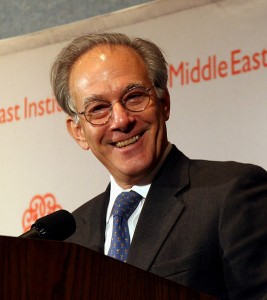This piece was reprinted by OpEd News with permission or license. It may not be reproduced in any form without permission or license from the source.
Cross-posted from Consortium NewsWashington Post columnist David Ignatius. (Photo credit: Aude)
A day after the surprise announcement that CIA Director David Petraeus was resigning because of marital infidelity, the pundits continue to miss the supreme irony. None other than the head of the CIA (and former bemedaled four-star general) has become the first really big fish netted by the intrusive monitoring of the communications of American citizens implemented after 9/11.
It is unclear whether it is true that, according to initial reports, Petraeus's alleged mistress and biographer, Paula Broadwell, was caught trying to hack into his e-mail. What does seem clear is that the FBI discovered that she had "unusual access" (to borrow the delicate wording of this morning's New York Times) to Petraeus during his time as commander of U.S. and NATO forces in Afghanistan from July 2010 to July 2011. The potential for compromise of sensitive information is equally clear.
Among those lionizing/eulogizing Petraeus on the morning after his resignation was Washington Post columnist (and longtime CIA apologist) David Ignatius, who argued that Petraeus "achieved genuinely great things." Ignatius lamented Petraeus's admission of the extramarital affair with the poignancy you might find in a novel by Leo Tolstoy or Victor Hugo about an admirable but ill-fated hero. Not surprisingly, Establishment pundits are disconsolate that their beloved David Petraeus has been brought down in such a tawdry way. They are already at work trying to salvage his legacy as the implementer of George W. Bush's much-heralded "successful surge" in Iraq (even though the sacrifice of nearly 1,000 more dead U.S. soldiers did little more than provide a "decent interval" between Bush's departure from office in 2009 and the final U.S. withdrawal/defeat at the end of 2011).
Ignatius, too, was a writer who was embedded with Petraeus and was dazzled by his charm. Ignatius wrote that he "spent nearly three weeks traveling with [Petraeus] during his CENTOM assignment, and saw how he fused the political and military aspects of command, as he met with sheiks and presidents and intelligence chiefs, in a way that should have been captured in a textbook for future commanders."
But Ignatius inadvertently acknowledged the futility of Petraeus's approach to Bush's wars. The Post columnist wrote:
"For all Petraeus's counter-insurgency doctrine, his Afghanistan command often appeared to be the equivalent of building on quicksand. No sooner were the Afghan forces 'stood up' than they would begin to slip away, back into the culture that was deeply, stubbornly resistant to outside pressure. In his last month in Kabul, Petraeus had all the tools of victory in hand except one -- the Afghan people and institutions."
So much for Petraeus's "brilliant" counter-insurgency doctrine. He had all the tools except the Afghan people and institutions, the two requisites for winning a counter-insurgency war!
So What's the Big Idea?
Ignatius adoringly adduces the following quote from Petraeus as proof of the ex-general's acute vision:
"As I see it, strategic leadership is fundamentally about big ideas, and, in particular, about four tasks connected with big ideas. First, of course, you have to get the big ideas right -- you have to determine the right overarching concepts and intellectual underpinnings to accomplish your organization's mission."Second, you have to communicate the big ideas effectively through the breadth and depth of the organization. Third, you have to oversee the implementation of the big ideas. And fourth, and finally, you have to capture lessons from the implementation of the big ideas, so that you can refine the overarching concepts and repeat the overall process."
Got that? That's probably right out of Petraeus's PhD dissertation at Princeton, or from a how-to book that might be called "Management Rhetoric for Dummies."
If only Petraeus and his colleague generals remembered the smaller -- but far more relevant -- ideas inculcated in all of us Army officers in Infantry School at Fort Benning in the early Sixties. This is what I recall from memory regarding what an infantry officer needed to do before launching an operation -- big or small -- division or squad size.
Corny (and gratuitous) as it may sound, we were taught that the absolute requirement was to do an "Estimate of the Situation" that included the following key factors: Enemy strength, numbers and weapons; Enemy disposition, where are they?; Terrain; Weather; and Lines of communication and supply (LOCS). In other words, we were trained to take into account those "little ideas," like facts and feasibility that, if ignored, could turn the "big ideas" into a March of Folly that would get a lot of people killed for no good reason.
Could it be that they stopped teaching these fundamentals as Petraeus went through West Point and Benning several years later? Did military history no longer include the futile efforts of imperial armies to avoid falling into the "graveyard of empires" in Afghanistan?
What about those LOCS? When you can't get there from here, is it really a good idea to send troops and armaments the length of Pakistan and then over the Hindu Kush? And does anyone know how much that kind of adventure might end up costing?
To Army officers schooled in the basics, it was VERY hard to understand why the top Army leadership persuaded President Barack Obama to double down, twice, in reinforcing troops for a fool's errand. And let's face it, unless you posit that the generals and the neoconservative strategic "experts" at Brookings and AEI were clueless, the doubling down was not only dumb but unconscionable.
Small wonder all the talk about "long war" and Petraeus's glib prediction that our grandchildren will still be fighting the kind of wars in which he impressed the likes of David Ignatius.
(Note: You can view every article as one long page if you sign up as an Advocate Member, or higher).






